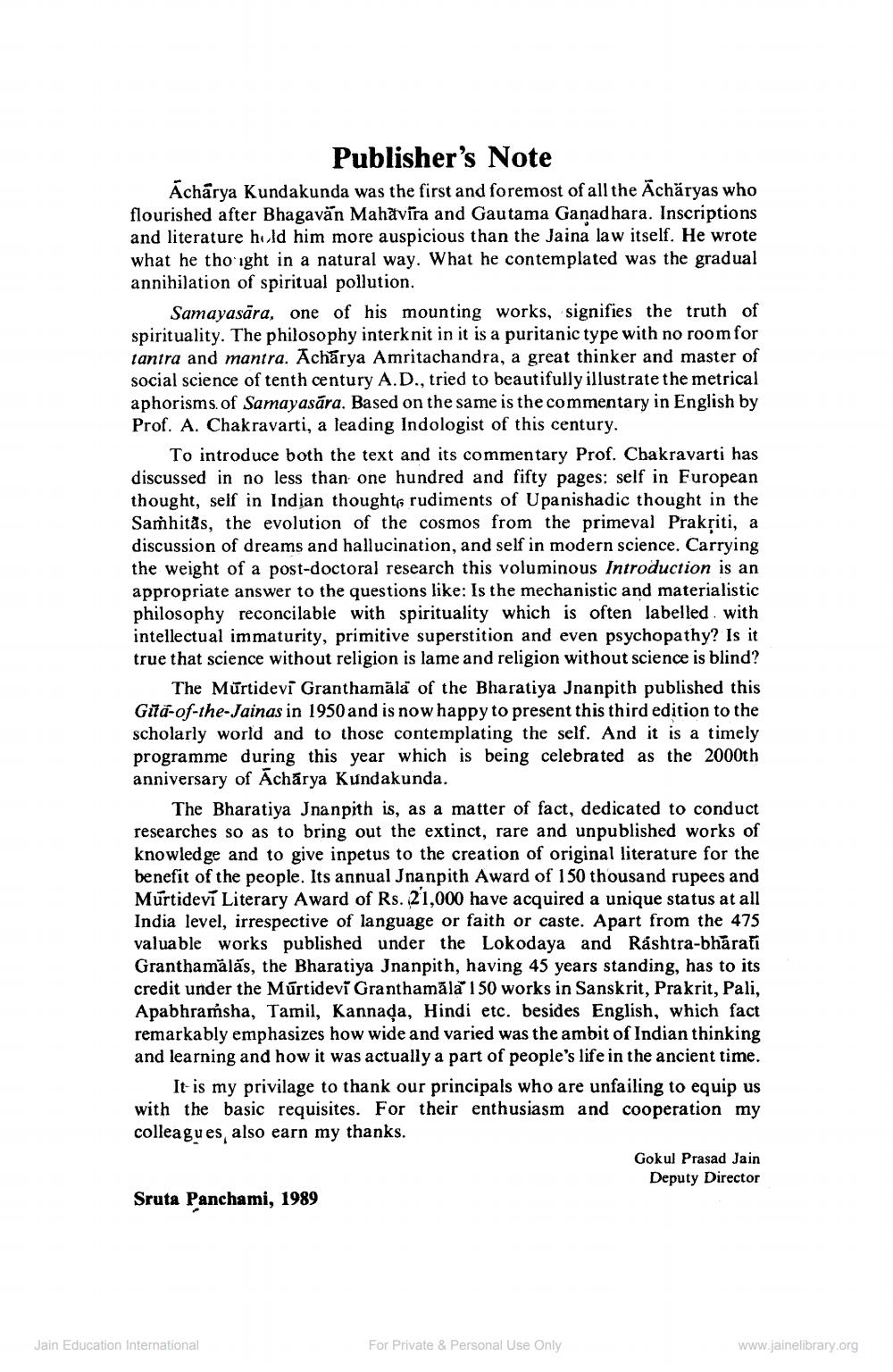Book Title: Samayasara Author(s): A Chakravarti Publisher: Bharatiya Gyanpith View full book textPage 7
________________ Publisher's Note Acharya Kundakunda was the first and foremost of all the Acharyas who flourished after Bhagavän Mahavira and Gautama Ganad hara. Inscriptions and literature huld him more auspicious than the Jaina law itself. He wrote what he thought in a natural way. What he contemplated was the gradual annihilation of spiritual pollution. Samayasāra, one of his mounting works, signifies the truth of spirituality. The philosophy interknit in it is a puritanic type with no room for tantra and mantra. Acharya Amritachandra, a great thinker and master of social science of tenth century A.D., tried to beautifully illustrate the metrical aphorisms.of Samayasára. Based on the same is the commentary in English by Prof. A. Chakravarti, a leading Indologist of this century. To introduce both the text and its commentary Prof. Chakravarti has discussed in no less than one hundred and fifty pages: self in Furopean thought, self in Indian thoughta rudiments of Upanishadic thought in the Samhitas, the evolution of the cosmos from the primeval Prakriti, a discussion of dreams and hallucination, and self in modern science. Carrying the weight of a post-doctoral research this voluminous Introduction is an appropriate answer to the questions like: Is the mechanistic and materialistic philosophy reconcilable with spirituality which is often labelled with intellectual immaturity, primitive superstition and even psychopathy? Is it true that science without religion is lame and religion without science is blind? The Mūrtidevi Granthamāla of the Bharatiya Jnanpith published this Gītā-of-the-Jainas in 1950 and is now happy to present this third edition to the scholarly world and to those contemplating the self. And it is a timely programme during this year which is being celebrated as the 2000th anniversary of Acharya Kundakunda. The Bharatiya Jnanpith is, as a matter of fact, dedicated to conduct researches so as to bring out the extinct, rare and unpublished works of knowledge and to give inpetus to the creation of original literature for the benefit of the people. Its annual Jnanpith Award of 150 thousand rupees and Murtideví Literary Award of Rs. 21,000 have acquired a unique status at all India level, irrespective of language or faith or caste. Apart from the 475 valuable works published under the Lokodaya and Rashtra-bhārati Granthamålás, the Bharatiya Jnanpith, having 45 years standing, has to its credit under the Murtidevi Granthamăla* 150 works in Sanskrit, Prakrit, Pali, Apabhramsha, Tamil, Kannada, Hindi etc. besides English, which fact remarkably emphasizes how wide and varied was the ambit of Indian thinking and learning and how it was actually a part of people's life in the ancient time. It is my privilage to thank our principals who are unfailing to equip us with the basic requisites. For their enthusiasm and cooperation my colleagues, also earn my thanks. Gokul Prasad Jain Deputy Director Sruta Panchami, 1989 Jain Education International For Private & Personal Use Only www.jainelibrary.orgPage Navigation
1 ... 5 6 7 8 9 10 11 12 13 14 15 16 17 18 19 20 21 22 23 24 25 26 27 28 29 30 31 32 33 34 35 36 37 38 39 40 41 42 43 44 45 46 47 48 49 50 51 52 53 54 55 56 57 58 59 60 61 62 63 64 65 66 67 68 69 70 71 72 ... 370
